Over the past weeks there has been much discussion surrounding Trinity College Dublin Students’ Union (TCDSU) and its policy regarding political affiliation. This discussion has stemmed from some students’ calls for an apolitical union and resulted in a failed vote to change the union’s constitution through referendum.
The union’s political alignment:
TCDSU is undeniably a left leaning institution for the most part. This position has been expressed through the union’s work in recent years. While this list is not exhaustive, a variety of examples of TCDSU’s political affiliations and stances are outlined below.
The union is led by President László Molnárfi who is a self-proclaimed communist. Molnárfi founded student activist group Students4Change which describes itself as a group of “socialist students focused on transforming higher education”.
The union’s leader is clear in his support for left leaning ideas. This, however, should come as no surprise following Molnárfi’s campaign based around radical action in which he described education as political saying: “It is a privilege to not have to be political – a privilege only a few can afford.”
The union is also political in its support of the Boycott, Divestment, Sanction (BDS) movement. This support has been mandated since a vote by students in 2018. The union’s support of BDS has been heightened since the increase in Israeli military operations in Gaza.
This pro-Palestine support has come in the form of participation in demonstrations and calling on government to support the Palestine movement. Recently the union took to Instagram to condemn the outcome of a Dáil motion to expel the Israeli ambassador and impose economic sanctions on Israel.
Last year TCDSU President Gabi Fulham called on College to dename the formerly Berkeley library. Since then, College has established the Trinity Legacies Review Working Group and submissions for a new name are being accepted.
This is an example of the union’s work to establish a university which takes accountability for its history while promoting inclusivity and diversity. While TCDSU has been successful in denaming the Berkeley, some have criticised the decision. This includes Professor David McConnell who said that the decision applied modern standards to an historic figure.
Recently, TCDSU engaged in a blockade of the Book of Kells exhibition. This blockade resulted in the exhibition being forced to close for the day and subsequently resulted in a loss of profits for the university. The union’s blockade resulted in a rent freeze for on campus and other student accommodation provided by College.
The union has been criticised by some for a perceived link to People Before Profit. While TCDSU has no official affiliation with the political party, it has attended protests with the likes of Richard Boyd Barrett TD. One example of such a protest can be seen in the union’s campaigning against vulture funds. Here TCDSU was joined by Students4Change and People Before Profit in protesting an event hosted by the law firm Matheson.
What does TCDSU’s constitution say about political stances?
The union’s constitution is clear in its stance on political affiliation. Under section 1.4 of the union’s constitution the TCDSU’s aims and principles are described. The section concludes with a note stating: “The Union shall pursue these objectives independent of any political, racial or religious ideology.”
The section also states that the union’s objectives shall be achieved without discrimination based on a number of factors including political affiliation. These lines clearly outline that the union is not intended to be a political organisation.
In an interview with the University of Manchester’s student newspaper, Mancunion, Molnárfi recognised the union’s breach of its constitution saying: “The constitution says that we have to be apolitical, and that’s grounds for impeachment. But no one will do it because our faction has a lot of support.”
Some sections of the union’s constitution are less clear in regard to political affiliation. An example of this is seen in the responsibility given to Sabbatical Officers. Here it is said that these individuals must represent students to a variety of groups such as Trinity’s board. What is also mentioned, however, is a responsibility to represent students to external groups.
This leaves the union in a position in which it is mandated to provide representation to students, including to external groups, but it is not prohibited to be politically aligned. This proves difficult in a country in which many students face challenges in relation to housing and their economic circumstances.
The future of the union’s political alignment:
Recently a motion to remove the union’s requirement to be apolitical was raised at council. If passed, the motion would change the constitution’s wording of section 1.4 from “The Union shall pursue these objectives independent of any political, racial or religious ideology.” to “The Union shall pursue these goals in a radical and egalitarian way, without intervention or control by outside parties.”
The motion ultimately failed to pass by two votes. What is important to note, however, is that over 50% of those who voted were in approval of the motion. The motion did not pass as a result of section 7.5.4 which states that a 60% majority is required for changes in the union’s long term policy.
Following the defeat Molnárfi took to Twitter saying: “There is clearly support for this [motion], so we will be collecting the 500 signatures to trigger a referendum.” If Molnárfi and his supporters are successful in collecting 500 signatures, the proposed change in the constitution will be put to the student population.
This will allow the union to be more explicit in its political views without fears of impeachment. Overall, it is almost certain that this union will continue to be politically aligned. It is not yet known if students will be given the opportunity to vote on the matter. What is even more unclear is what will happen if students vote in favour of an apolitical union.






